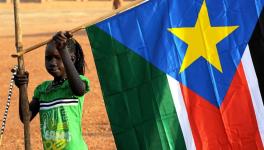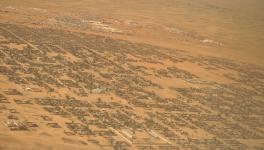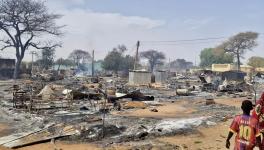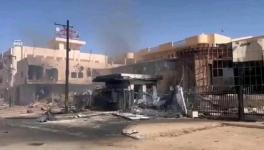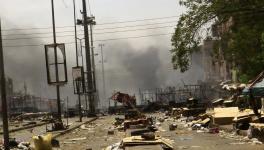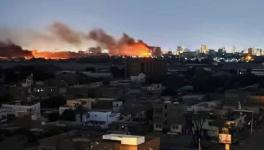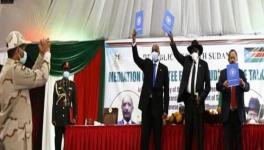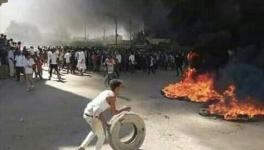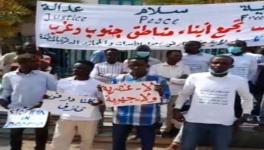Sudanese Protesters Demand Immediate Transfer of Power to Civilian Forces
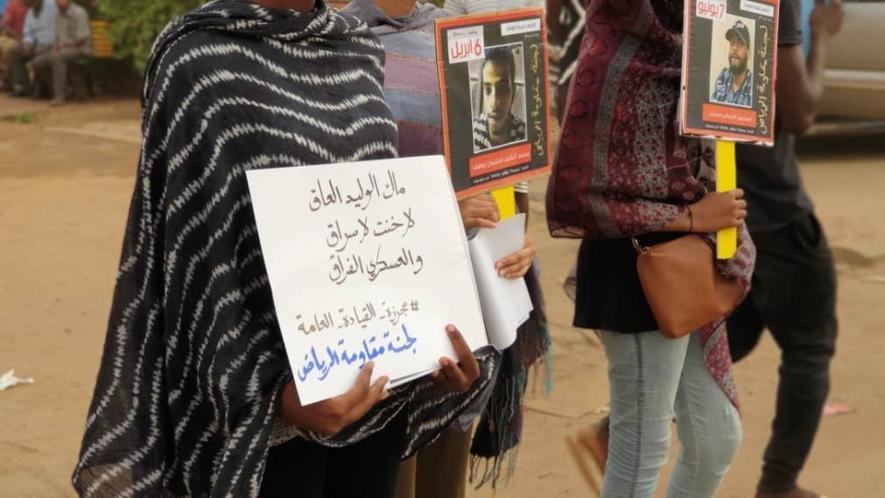
Sudanese protesters remember their martyrs. Photo: Sudanese Professionals Association
Mass demonstrations in Sudan have continued over the weekend, despite the signing of a power sharing deal by a section of the opposition and the military junta.
On July 21, in the capital city of Khartoum, a public parade was held in defiance of the militiamen of the Rapid Support Forces (RSF) who continue to be deployed on the streets. On June 3, the RSF, headed by the vice-president of the military junta, massacred over a hundred protesters.
Residents of the city marched in the parade, demanding justice for the killing and a complete transfer of power to civilian authorities.
Over 500 kilometers to the southeast of Khartoum, in Ad-Damazin, the capital city of Blue Nile State, protesters held a demonstration before a court, demanding that the perpetrators of the massacre be brought to justice.
A similar demonstration was held before the court premises in Atbara, a railway town with a history of labor militancy where the uprising had started in December last year before spreading throughout the country.
For the protesters, justice for their comrades and a transfer of power to a civilian government are closely intertwined demands. The former cannot be achieved without the latter.
Yet, the political agreement between the military junta and a section of the opposition – prominently the centrist National Umma Party and the Sudanese Congress Party – only paved way for strengthening the military’s position in the transition government.
This is because in this political agreement, the military junta backtracked on what it was thought to have previously agreed to. It was agreed, albeit not in writing, that the opposition block – which had come together under the umbrella of the Declaration of Freedom and Change Forces (DFCF) – would appoint the entire cabinet and 67% of the legislative council. The remaining 33% of would be shared by other parties which were not part of the ruling coalition led by the ousted president Omar al-Bashir.
However, as per the final agreement, the military junta will appoint both the interior minister and the defense minister in the cabinet, which will leave all armed and police forces in the hands of those appointed by the military junta.
Further, in an attempt to prevent the DFCF from using the legislative council to dissolve the militia, the military junta, in this agreement, has also called for a review of the 67% allotted to the DFCF, and has demanded parties which were part of the former regime also be allowed seats in the council.
The military has also backtracked on its previous position that international bodies will supervise the investigation of the human rights atrocities committed since it assumed power in April.
When the meeting where this agreement was signed was going on, tens of thousands of protesters took to the streets around the country at the call of Sudanese Professionals Association (SPA). At the Green Square in Khartoum, where a mass rally assembled, protesters declared that the square would be renamed as Freedom Square.
While many reports indicated that this demonstration was held in celebration of the agreement, the slogans raised there against compromise indicated otherwise. Protesters replaced a sign board with the words ‘Green Square’ with a banner insisting ‘Justice first.. loyalty to the revolution’s martyrs’, communicating to the leaders who were at the meeting that no compromise would be accepted by the streets.
Yet, a section of the DFCF signed the agreement. However, other sections of the DFCF rejected the agreement complaining that it goes against the goals of the revolution.
This includes the SPA, the National Consensus Forces – which is a block consisting of the Sudanese Communist Party (SCP), the parties of Baathists, Arab Nationalists etc – and all the armed rebel groups which are engaged in a civil war with the state.
In Khartoum, the civilian forces in the DFCF are currently engaged in discussions to resolve their differences and arrive at a unified position which represents the demands of the protesters on the streets.
In the meantime, in Ethiopia’s capital city of Addis Ababa, representatives of the DFCF are meeting with those of the armed groups, to find a way to end the civil war which is one of the most important tasks set before the transitional government.
Get the latest reports & analysis with people's perspective on Protests, movements & deep analytical videos, discussions of the current affairs in your Telegram app. Subscribe to NewsClick's Telegram channel & get Real-Time updates on stories, as they get published on our website.









